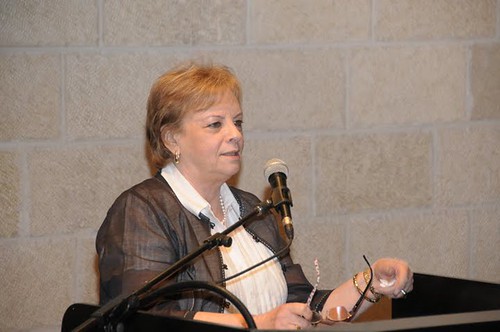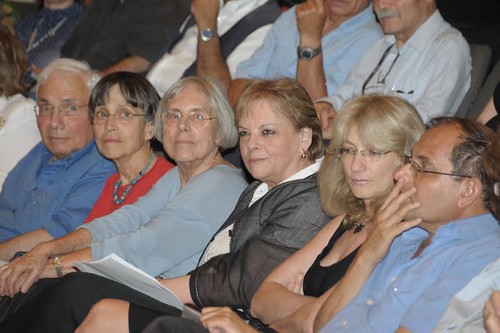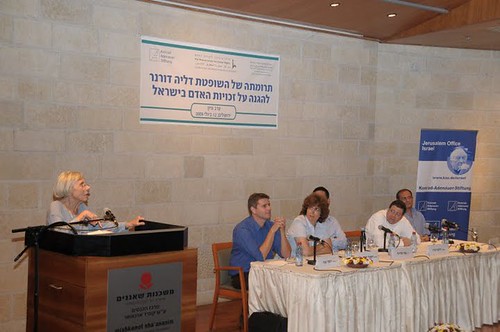Justice Dalia Dorner served in the Israeli Supreme Court between the years 1993–2004, and has been one of the most prominent figures in the Israeli judicial landscape in recent years. During her term at the Supreme Court, she was recognized as highly sensitive to issues of human rights, with verdicts that promoted human dignity, women rights, the rights for free speech, homosexuals’ rights, detainees’ rights, and so forth. Following her retirement, Justice Dorner has remained highly active in the public sphere, chairing several committees of inquiry, heading the Israeli Press Council, and lecturing on human rights.

The evening commenced with greetings by Justice Dorit Beinisch, Chief Justice of the Supreme Court; Prof. Shulamit Almog of Haifa University and co-editor of the book; and Ms. Catherine Hirschwitz on behalf of the Konrad-Adenauer-Stiftung.
The greetings were followed by a panel dedicated to the protection of human rights, chaired by Prof. Yuval Shany, Academic Director of the Minerva Center for Human Rights.
Prof. Daphna Barak-Erez of Tel Aviv University discussed Justice Dorner’s promotion of social rights in particular. She argued that social rights should be defended with no apprehension, regardless of its critics, by the Supreme Court as well as by other state authorities. Justice Dorner, she claimed, managed to promote social rights through both channels with no hesitation or fear.
Dr. Zvi Triger of The College of Management Academic Studies discussed attitudes towards women in the Israeli law. He claimed that despite legislation that in theory protects women and ensures their rights, women in reality often lack protection from the law and are discriminated against in nearly all spheres of life. According to Dr. Triger, Justice Dorner contributed to the breaking of these patterns through her verdicts and activity, though there is still a long way to go.

Prof. Yoram Rabin of The College of Management Academic Studies discussed Justice Dorner’s verdict that acknowledged the state's responsibility to provide special education for those in need of it. He claimed that with this verdict Justice Dorner based a constitutional right for education. Moreover, the verdict was introduced as a prime example of an activist ruling, i.e. one that not only uses noble rhetoric but also has an operative side to it.
Finally, Prof. Mordechai Kremnitzer of the Hebrew University of Jerusalem described Justice Dorner as consistently defending the rights of those who are “less nice”, that is populations that are on the margins of society and detainees who are often treated as convicted criminals. Furthermore, he argued that Justice Dorner participated in building and deepening the ethos of human rights in Israel, using international and Jewish resources rather than only thin, technical arguments.

Justice Dorner herself concluded the evening. Her message was one of ambivalence: on the one hand, she argued that Israel has managed to create a democratic rule with an independent justice system, regardless of the lack of a written constitution. On the other hand, she expressed her worries over recent voices calling for a change in the constitutional rules of the game, which – as stated – are based on weak foundations. These rules, she claimed, are essential for a proper democracy in which all members of society can be treated as equal.
On this occasion, many members of the legal establishment of Israel gathered at the Konrad Adenauer Conference Center. Among them were some twenty current or retired Supreme Court Justices, including former Presidents Barak and Shamgar, as well as many other judges, lawyers and scholars.
Temas
Proporcionado por
Auslandsbüro IsraelSobre esta serie
La Fundación Konrad Adenauer está representada con oficina propia en unos 70 países en cinco continentes . Los empleados del extranjero pueden informar in situ de primera mano sobre acontecimientos actuales y desarrollos a largo plazo en su país de emplazamiento. En los "informes de países", ellos ofrecen de forma exclusiva a los usuarios de la página web de la fundación Konrad Adenauer análisis, informaciones de trasfondo y evaluaciones.
Datos del pedido
Lugar de publicación
Israel Israel



